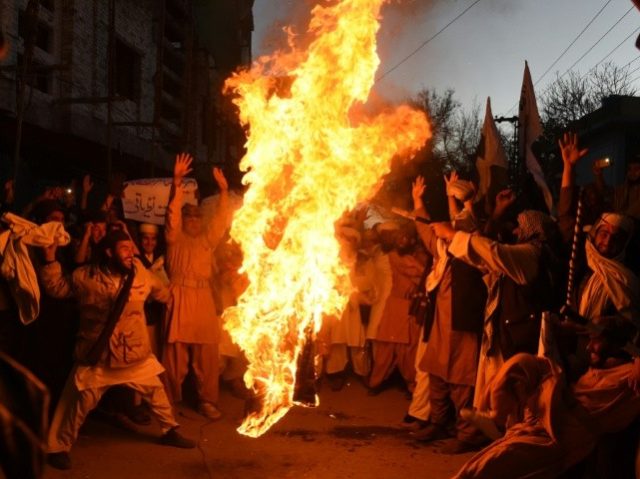The U.S. State Department announced Thursday that it would add Pakistan—and ten other countries—to its Special Watch List for severe religious freedom violations, citing the egregious abuse of Christians, Hindus, Ahmadi Muslims, and other minorities in the country.
The move follows President Donald Trump’s announcement on Twitter that the United States would begin cutting off military aid to Pakistan in response to that government’s inaction in the face of multiple terrorist organizations establishing save havens within its borders. The Pakistani government has denied that it has not endeavored sufficiently to fight terrorism.
The State Department has the power to designate nations of concern and place them on its Special Watch List as per the International Religious Freedom Act of 1998. In a statement Thursday, the agency announced that Secretary of State Rex Tillerson had designated Burma, China, Eritrea, Iran, North Korea, Sudan, Saudi Arabia, Tajikistan, Turkmenistan, and Uzbekistan “Countries of Particular Concern” for religious freedom.
Pakistan was placed on the Special Watch List for “severe violations,” suggesting evidence that religious minorities are significantly more imperiled in that country, although the law gives Tillerson the “ultimate responsibility for interpreting the legal standard for SWL designation.”
“We recognize that several designated countries are working to improve their respect for religious freedom; we welcome these initiatives and look forward to continued dialogue,” the State Department noted. “The United States remains committed to working with governments, civil society organizations, and religious leaders to advance religious freedom around the world.”
Pakistan is officially an Islamic republic whose constitution requires all laws to be in conformity with the Sharia, or Islamic law. The nation’s penal code prohibits Ahmadi Muslims from identifying as Muslim and using Islamic greetings. It also bans the “defiling” of the Quran and words that can be interpreted as “blasphemy” against Islam. It proscribes the death penalty for certain violations of “blasphemy,” including personally insulting Muhammad.
According to Under Caesar’s Sword, a religious freedom project by the University of Notre Dame, Christians suffer tremendously both at the hands of these discriminatory laws and at the hands of violent mobs, which regularly congregate to attack and kill Christians accused of blasphemy. As most Christians come from modest backgrounds and lower castes, taking jobs like running kilns, cleaning sewers, and sweeping, they also face class discrimination.
The British Pakistani Christian Association (BCPA), a group that advocates for Christian rights and chronicles abuses, applauded that State Department’s measure and the rescinding of aid to the country, urging the United Kingdom to consider similar measures.
“In recognising Pakistan on the US Special Watch List for religious violations, the Trump Administration have brought great relief to hundreds of Pakistani Christian NGO’s who have been challenging for persecution to be recognised by western nations since its inception,” Wilson Chowdhry, the chairman of the BPCA, said in a statement.
“Christians in Pakistan are caught in the bondage of slavery, many of their young women are raped and forced into Islamic marriage, they are bullied and murdered by fellow school children,” he noted. “They are burned alive in the streets, the majority serve as cleaners or sweepers or sewage workers and they are held hostage to bias laws such as the draconian blasphemy laws.”
The BCPA has documented a large number of crimes against Christians in Pakistan in recent memory. In August, a 16-year-old boy was arrested for blasphemy after being severely beaten by Muslims in public. The boy, Asif Stephen, was arrested after a witness called the police urging them to stop the beating.
Another Pakistani teen, Sharoon Masih, was beaten to death in September after being accused of drinking water from a water cooler used by Muslim boys. His “crime” resembles the facts of the case against Asia Bibi, perhaps the most famous victim of Pakistan’s blasphemy law, who was sentenced to death for allegedly disparaging Muslims after being accused of drinking water from a “Muslim” well.

COMMENTS
Please let us know if you're having issues with commenting.